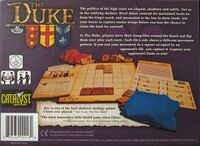The Duke
| The Duke | ||
|---|---|---|
 |
||
| Strategy game published by Catalyst Game Labs |
||
| No. of Players | 2 | |
| Session Time | ~30 Minutes | |
| Authors | Jeremy Holcolm, Steven McLaughlin | |
| First Publication | 2013 | |
The Duke is a board game from Catalyst Game Labs that can basically be described as chess for bastards. It vaguely resembles shogi in that pieces are mutable and two sided, but involves some random chance.
Gameplay[edit | edit source]
Like chess or shogi, the game is played on a square grid, although the board is a 6x6 grid. Each player has a set of playing pieces. In most variants each player has an identical set but some variants involve asymmetrical sets. A piece is a flat, square token with two faces. Each face has a 5x5 grid denoting the moves available to the piece when that face is up. One of the two faces is the starting face and this must be face up when the piece is first placed on the board.
To setup for a new game, each player places their Duke piece and two footmen pieces on the board. The player's Duke must be adjacent to their edge of the board, and their footmen must be adjacent to their duke. Their remaining pieces are placed in a bag.
Play proceeds in turns, with each player taking one action. An action may involve moving a piece, taking a non-moving action with a piece, or drawing a new piece and placing it on the board, starting side up, adjacent to the player's Duke. If a piece moves or uses a non-moving action, the piece is flipped over. Flipping a piece changes the set of actions available to the piece. As with chess, the actions of pieces can result in the capture of opponent pieces, which are taken out of play.
Gameplay continues until one player takes an action which results in the capture of the opponent's duke, resulting in victory.
Reception[edit | edit source]
Although cleverly designed and stylish with its fancy wooden pieces, The Duke quickly earned a reputation for being fuck-this-shit complicated. Not in the crazy german game with a bajillion cardboard tokens sense. No, The Duke's simple concept conceals its complexity just below the surface, the result of combining mutable pieces and random chance in reinforcements. You're essentially having to play Memory with all your pieces and your opponent's pieces just to form a strategy.
Tellingly, MENSA loved it and gave it their select award.
| Board Games | |
|---|---|
| Classics: | Backgammon - Chess - Go - Tafl - Tic-Tac-Toe |
| Ameritrash: | Arkham Horror - Axis & Allies - Battleship - Betrayal at House on the Hill - Car Wars Clue/Cluedo - Cosmic Encounter - Descent: Journeys in the Dark - Dungeon! Firefly: The Game - HeroQuest - Monopoly - Mousetrap - Snakes and Ladders - Risk Talisman - Trivial Pursuit |
| Eurogames: | Agricola - Carcassonne - The Duke - Settlers of Catan - Small World - Stratego - Ticket to Ride |
| Pure Evil: | Diplomacy - Dune (aka Rex: Final Days of an Empire) - Monopoly - The Duke |
| Others: | Icehouse - Shadow Hunters - Twilight Imperium - Wingspan |